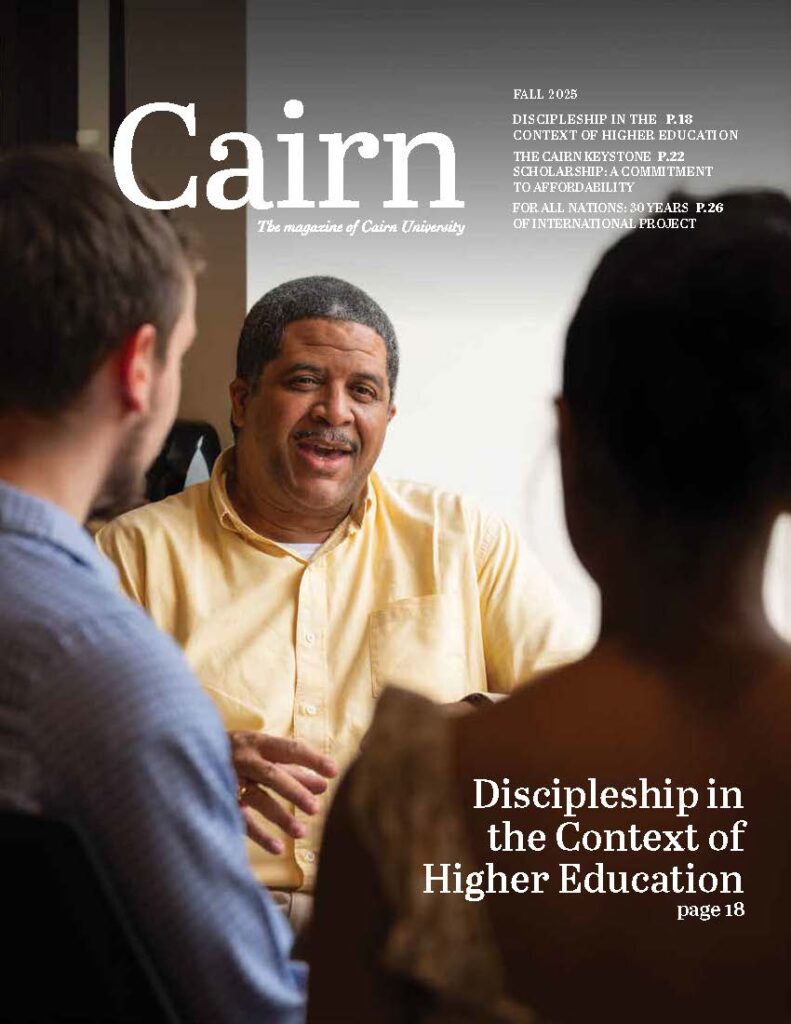Over 15 years ago, the late theologian Marva Dawn wrote a helpful little book that she called Talking the Walk: Letting Christian Language Live Again, in which she encouraged readers to consider the depth of meaning of several words that have long been part of the Christian tradition. She warned that we are in danger of corrupting these words by treating them as clichés or slogans and, in some cases, neglecting them all together.
In her introduction, she explains that the book is her response to a crisis in churches—a crisis she describes as “the frequent corruption or rejection of key words in biblical faith for reasons that often seem to be merely quick fixes of, instead of genuine solutions to, deeper problems.” She continues, “During the last century, English-speaking Christians have been stressing that we should walk our talk, that our way of living should match the values we espouse. That Christians frequently don’t act on what they know and say is still a problem. However, the opposite is often increasingly true: that the way we talk doesn’t offer the deepest truth of the Christian faith. Could we also practice letting the Christian language live again in all of its glory? Can we work together with the whole church throughout time and space on rectifying the names and thereby learn more fully to talk our walk?”
Marva Dawn was concerned that some words have gotten a bad reputation while others, like “hell,” are largely ignored and others, like “awesome” (which is a biblical word), are used with such excess that we lose sight of their theological significance and profundity. These examples are in addition to other words that Christians treat as outdated or irrelevant. Surprisingly, one Christian word that Marva Dawn didn’t include in her book is “love.”
In the relatively short space I have, I’d like to begin to think about the profundity and the significance of love, particularly the love Scripture commands us to have for one another. Of course, anything I say about the topic is going to be just scratching the surface. If you ever wonder why it is that there are so many theology books with the title “Toward a Theology of . . ., ” it’s because the author is saying upfront, “I’m not going to say everything that there is to say about this. This isn’t the last word, but this is an entryway.” And so we might think about this as “toward a theology of love.”
We should begin by asking, “What does love mean?” You might think that this is an unnecessary exercise. “Who doesn’t know what love is?” you might ask. “It’s obvious, isn’t it? Why in the world do we need to take time to explore what love is?” I would answer those questions in this way: because there are a multitude of misconceptions about the nature of love.
Common cultural notions of love prevail in our world. For example, “love’s primary aim is to make the one loved feel good.” Or “love never causes discomfort to the one loved.” Or “love never finds fault or corrects but leaves the object of love to him or herself to do as seems best to them.” Or “love is simply being nice or courteous.” If we are careless, we will unwillingly embrace one or more of these culturally prevalent misconceptions and read them into the Bible wherever we come across the word love. Consequently, I can think I’m obeying God by doing what in my mind is loving my neighbor. But if my notion of what it means to love is foreign to God’s, then in actuality I’m not really obeying His command, regardless of how good my intentions might be. Bowing to God in obeying His command to love my neighbor entails submitting to His description of what love is. He has not left us to define that for ourselves.
It is not as though God has given us a blank check and said, “I’ve signed it; you fill in whatever amount you want.” No, He calls us to love, and He has revealed to us the variety of forms that true love takes. When many people claim that all religions basically teach the same thing, one of the things they will cite is that various religions have teaching about loving others or some variant of what we call the Golden Rule: Do unto others as you would have them do unto you. While it is certainly true that the command to love others is common to a number of religious systems, it’s mistaken to assume that all religious systems hold a common understanding of the nature of love.
There is something unique about the Christian conceptualization of love, and it’s important for us to recognize that. If we are committed to following Jesus, if we say that we are His disciples, a question that we should frequently ask ourselves and one another is, “How closely does my understanding of what it means to love correspond to what Jesus taught and modeled about love?”
Jesus’ understanding of love was dependent upon a comprehensive view of the nature of reality—what is real, what is true. It emanated from knowledge about God and people. Jesus’ concept of love is part of a very specific picture of the way things are or, in language that students hear at Cairn very frequently, a particular worldview.
It’s not enough to just use the same word that the Scriptures use and therefore conclude that we’re talking about the same thing that the Scriptures are when they use the word “love.” No, we have to inquire whether we are operating with the same worldview as that of the Bible and understanding love in that context.
What you really believe about the nature of the world greatly influences how you live in it. Another way of putting that would be to say what I am firmly convinced of concerning the nature and structure of reality directs the course of my life and relationships.
Given this, I would like to look at three biblically derived presuppositions about love, things that the Bible says are essential to the nature of love. I will then explore the question, “Is this really how we think about love?”
Presupposition 1: Biblical love presupposes the existence of a real, objective goodness.
Biblical love presupposes there is a true and real goodness that is not dependent upon what I think or what I feel but has an existence that is completely independent of me. Obviously, that goodness is an expression of the real God. Biblically speaking, love cannot be separated from holiness and truth. We see this in a number of places in the Scriptures. For example, when Paul is describing love in 1 Corinthians 13, he says that it “does not rejoice at wrongdoing”—and you would expect him to say it rejoices at righteousness. But what he says is, “but it rejoices with the truth.” Truth, righteousness, and love—biblically speaking—are inseparable. When Paul is writing to Titus, and he’s explaining to him the various qualifications someone who is aspiring to be an elder should possess, he says this: “For an overseer, as God’s steward, must be above reproach. He must not be arrogant or quick tempered or a drunkard or violent or greedy for a gain, but hospitable, a lover of good, self-controlled, upright, holy, and disciplined” (1:7–8, italics mine). That presupposes that there is a true goodness that we are to conform to.
When he writes his second letter to Timothy, he warns Timothy that in the last days there will be increasing corruption among his people: “But understand this, that in the last days there will come times of difficulty, for people will be lovers of self, lovers of money, proud, arrogant, abusive, disobedient to their parents, ungrateful, unholy, heartless, unappeasable, slanderous, without self control, brutal, not loving good, treacherous, reckless, swollen with conceit, lovers of pleasure rather than lovers of God” (2 Tim. 3:1–4, italics mine). It is interesting that love permeates that passage: what it is that people are going to love and what it is that they are not going to love. Notice that he says, “not loving good” and “lovers of pleasure rather than lovers of God.” He is not thinking that goodness has any existence independent of God. But he is saying that there is a standard of what is really good that, as we conform to it, is actually profitable for us and beneficial to us and fosters flourishing, well-being, and thriving.
The reason that this has become such an area of interest to me is because over the years that I have taught, I have been increasingly alarmed by the skepticism that I have seen amongst even professing Christians as to whether or not there is actually an objective standard of goodness. They entertain the idea that goodness is simply in the eye of the beholder—goodness as I deem it to be. We call this moral relativism. Relativism denies that there is any such thing as objective, knowable, real goodness. This is hostile to and incompatible with biblical love. If there is no real good, no knowable design for optimal human flourishing, then there is no real love; there can only be indifference. Moral relativism is adversarial to biblical love. It is destructive to it. Biblical love presupposes the existence of real, objective, knowable goodness, and it seeks to influence others toward it and by it. To love biblically is to seek, to move one toward and to move one by the goodness that God has revealed.
It is incoherent to affirm the biblical command to love your neighbor while denying the Bible’s insistence that there is a divinely revealed moral structure to reality that is intended to foster our flourishing as we conform to it and submit to it. If there really is a true and objective goodness that exists outside of us—and if our thriving as human beings depends upon us knowing and conforming to that—then it simply isn’t loving to encourage people to live as they please or to rely on themselves as the standard of what is good. We might say concerning this point that biblical love presupposes the existence of an objective and absolute authority as well, because that goodness has an authority. In Matthew 22:37–40 and Romans 13:8–10, Jesus and Paul are speaking about the divine, authoritative commands to love. Love and law (in terms of God’s authoritative instruction) are intertwined. The command to love one’s neighbor as oneself is part of God’s law, and God is the authority who establishes what love looks like.
Presupposition 2: Biblical love presupposes that there is something of greater value than my immediate comfort, convenience, or pleasure.
Years ago, I read a book co-authored by the late Christian psychologist Larry Crabb and Dan Allender called Encouragement: The Key to Caring. In it, they say the following: “It is most natural to maintain a commitment to our own interpersonal comfort, a commitment that creates a feeling of uneasiness whenever we are tempted to risk authentic involvement in someone else’s life. Most of us are simply afraid to threaten our sense of comfortable well-being.” In Loving God’s Way, a book that describes the various “one anothers” of the New Testament, author Gary DeLashmutt notes:
“Our culture has largely rejected the legitimacy of moral absolutes and therefore equates moral correction with unloving intolerance. According to today’s secular climate, we are capable of healthy moral self-direction, and external moral correction renders us dysfunctional. Admonition is therefore unnecessary and even harmful. Unfortunately, many Christians have assimilated this mentality to a remarkable degree. They view encouragement as mandatory to spiritual growth, but admonition is tragically absent from their view of love.”
Think about it: If there is a true, objective goodness that is necessary for you to really thrive, it is not inherently mean of me to seek to move you toward it and to involve myself in your life to some degree if I think you’re diverging from it. We can think about this with respect to evangelism. We can think about this with respect to Christian living and mutual discipleship. Do people abuse this? Of course, but let’s not allow the pendulum to swing so far to the other end that we entertain a view of love that is not biblical. Any conception of love that precludes, that does away with the idea of any kind of moral correction, or that automatically equates such with hatred or hostility is unbiblical.
The author of Proverbs says “Better is open rebuke, then hidden love. Faithful are the wounds of a friend. Profuse are the kisses of an enemy” (27:5–6). There are people who will never do you any harm in terms of never emotionally causing any sting. They will flatter you to death, but do not think that is necessarily an indication of love. Someone who is a faithful friend will sting you at times—not out of hostility, but because they care about you and want God’s good for you. The author of Ecclesiastes says, “it is better for a man to hear the rebuke of the wise, then to hear the song of fools” (7:5).
Presupposition 3: Biblical love presupposes God-trusting courage.
The more I delve into what the Bible has to say about real love, the more I have to conclude that a good deal of what passes for love, even in my own life, is actually self-indulgence in disguise. A lot of what is called “love” is motivated more by self-protection than by genuine concern for the true well-being of others. Might it be that I want to believe definitions of love that require the least of me, those that minimize the possibility of being rejected? If love means never making someone experience discomfort, then I don’t have to worry about experiencing their potential rage. If love is simply being nice and never seeking to move someone closer to what is truly good by questioning or correcting them, then I remove the risk of being misunderstood, or worse, ridiculed or even despised.
What’s more, I can write off anyone who might be seeking to love me by offering faithful wounds as a legalist or a judgmental hater. We are often so afraid of being called a “hater” that we fail to love each other in biblical ways. If our hearts are captivated by those fears, we will not love each other as we ought. And we are living in a culture that incessantly feeds those fears through such things as social media. We are living in a culture that is constantly telling us that what matters most is that you do not get “canceled.” And to the degree that I buy that, I am going to reject God’s call to love.
In Crabb and Allender’s book, they note that there is a paradox to love. They say that “to love a person, I must be willing to lose my relationship with him. Dependently holding on to anyone or anything but God is, in its final form, idolatry. Idolatry is at root a fear of the wrong God.”
As Christians, we know ultimately what love is by the person of Jesus Christ. The Apostle John wrote “In this is love, not that we have loved God, but that He loved us and sent His Son to be the propitiation for our sins” (1 John 4:10). Jesus acknowledged that there is a real good, and He was willing to go to great lengths in order to bring us to it. And He did so, as the Scriptures tell us, by entrusting Himself continually to Him who judges righteously.
There was a God-dependent boldness and courage that led Him to love as He did. “He committed no sin,” Peter writes, “neither was deceit found in His mouth. When He was reviled, He did not revile in return. When He suffered, He did not threaten, but continued entrusting Himself to Him who judges justly. He Himself bore our sins in His body on the tree that we might die to sin and live to righteousness. By His wounds you have been healed, for you were straying like sheep, but have now returned to the Shepherd and Overseer of your souls” (1 Pet. 2:22–25).
It is my hope that we will, individually and collectively, frequently ask the question that I mentioned earlier: “How closely does my conception of love approximate that of Jesus?” Doing so is an integral part of our being conformed more to His likeness.
This article was originally published in the Fall 2021 issue of Cairn Magazine.










